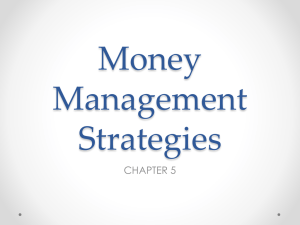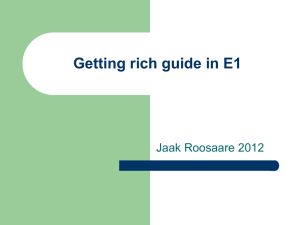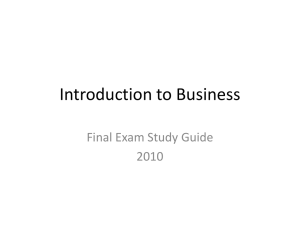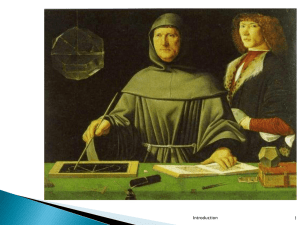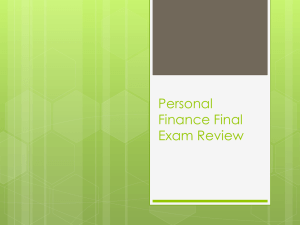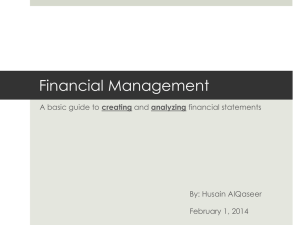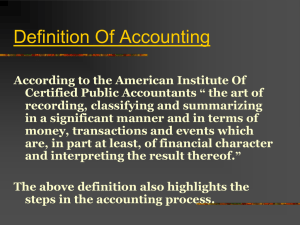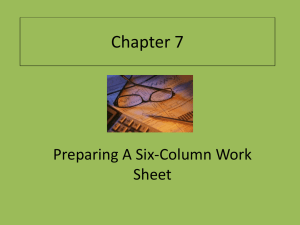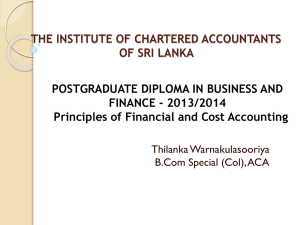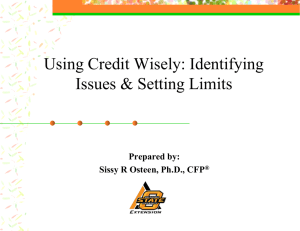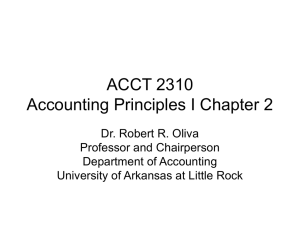File
advertisement
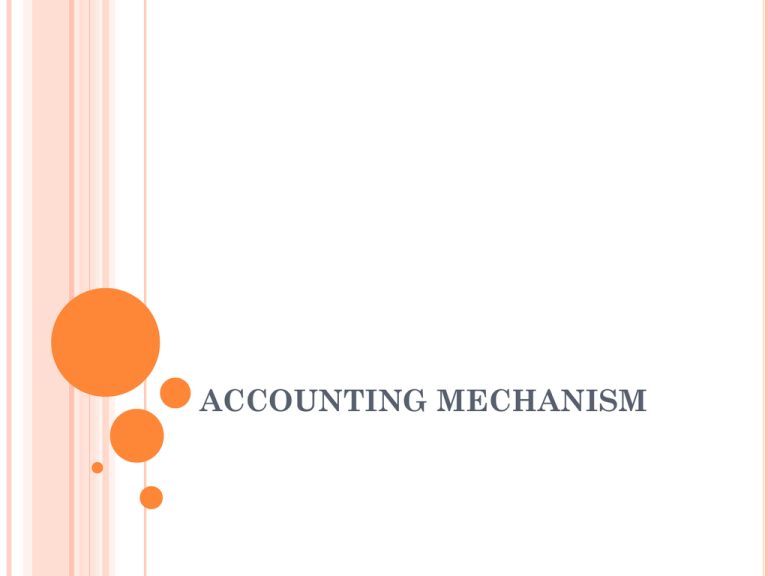
ACCOUNTING MECHANISM Accounting Documents and Records Flow of data 1. Recording transactions in journal – passing journal entries through double entry system 2. Posting into a ledger - classifying all entries of a similar account into a ledger 3. Ledger balancing – closing all ledger accounts and finding out the balance in each ledger account. 4. Preparing trial balance – Listing all ledger balances into debit and credit balances. 5. Passing adjustment entries / closing entries 6. Preparation of Profit & Loss A/c and Balance Sheet. Account : A record of transactions related to a particular item of expense , income , assets or liabilities Expenses : Salaries ,repairs, traveling , audit fees , printing & stationary etc. Income : Sales , dividend , interest , commission etc. Assets : Buildings, Machinery , Furniture , Debtors, Prepaid expenses, Cash, Bills receivable Liabilities : Debentures, loans, creditors, expenses payable, Bills payable, Provisions Capital : Share capital, Reserves, Retained earnings Classification of accounts 1.Real Accounts, Personal Accounts, Nominal Accounts 2.Asset Accounts, Liability Accounts, Income Accounts, Payment Accounts Understanding Outstanding and prepaid accounts and the concept of Matching principle Outstanding Expenses – Liability Outstanding Income - Asset Prepaid expenses - Asset Pre received income - Liability Rules of debit / credit Double entry system of recording entries : Every transaction recorded must have equal debits and credits Analysis of transactions Accounting equation can be expanded as : Liabilities + Capital+ Revenues =Assets +Expenses+ Dividends Effect Basic Increase Decrease Asset, Expenses, Dividend Debit Debit Credit Liability,Capital,Revenue Credit Credit Debit Class exercise 1 Put a cross in the appropriate column to indicate the type of account and the accounts normal balance Type of account Asset Liability Capital Salaries Miscellaneous expenses Prepaid rent Share capital Office supplies Interest income Commission earned Rent expense Proprietors drawings Bills receivable Margin money deposit Cash Debtors Creditors Advance to suppliers Unearned professional fees Advance from debtors Electricity charges Professional fees earned Income tax payable Income tax earned Dividends Bills Payable Outstanding expenses Debentures Reserves Provision for tax Bank balance Telephone expenses Normal balance Debit Credit Class exercise 1 Classify the following ledger balances into debit and credit balances and prepare a trial balance. Building Office equipment Cash Creditors Debtors Bills payable Purchases Sales Salaries Electricity 25000 20000 14000 Telephone expenses Share capital Loan taken 500 50000 5000 10000 Prepaid insurance 1000 21700 Unpaid repairs expenses 500 3000 Dividend received 200 12000 Reserves 2000 30000 Provision for tax 2000 5000 Depreciation 1500 1000 Advertisement 1000 Class exercise 2 Venus Music corner provides is in the business of providing audio CDs to customers. During March the accounts were maintained by a professional accountant On March 31 , the records showed a balance of Rs.21140 in his capital account. Since he could not afford an accountant , he starts maintaining the accounting records himself. He prepared the statements for the month of April 2006 and was shocked to find that his business had not fared well. He wants you to review his statements. Profit & Loss A/c for the month ended April’10 Expenses Revenues Salaries 5600 Investments by owner 3000 Electricity 410 Service revenue recd 600 Advertisement 130 in advance Rent 300 Drawings 4000 Loss for the month 6840 10440 10440 Balance Sheet as on April 30, 2010 Liabilities Assets Creditors 2510 Recording equipment 25500 Service revenue Supplies 2190 earned 12660 Debtors 1210 Capital 14300 Cash 570 29470 29470 Schedule VI Part I – Balance Sheet The company’s balance Sheet may be in horizontal or vertical form It shall disclose current years as well as previous years figures Details may be given in Schedules attached to Balance Sheet Figures may be rounded off to the nearest ’00 or ’000. It can also be in 00.00 format. Format of Horizontal Balance Sheet P.Y 1. 2. 3. 4. 5. Liabilities C.Y Share Capital Reserves & Surplus Secured Loans Unsecured Loans Current Liabilities and and Provisions A. Current liabilities B. Provisions Footnote : Contingent liabilities P.Y Assets C.Y 1. Fixed Assets 2. Investments 3. Current Assets, Loans and Advances A. Current Assets B. Loans and Advances 4. 1 Miscellaneous Expenditure 2. Profit and Loss A/c Dr bal Vertical form of Balance Sheet I. Sources of funds 1. Shareholders funds Share capital Reserves & Surplus 2. Loan Funds Secured loans Unsecured loans II. Application of funds 1. Fixed Assets 2. Investments 3. Current assets , loans and advances less: Current liabilities and provisions 4. Miscellaneous expenditure. Footnote for contingent liabilities Z Schedule VI Part II – Profit & Loss Account General requirements It shall disclose every material factor w.r.t Incomes & Expenditures Any item> 1% of the turnover or Rs.5000 whichever is higher should be shown separate item and not under miscellaneous expenses. 1.Turnover 2. Commission paid to selling agents, brokerage and discount allowed 3. Value of raw material consumed 4. Opening and closing stock of goods and raw materials 5. Depreciation 6. Interest paid 7. Income tax 8. Transfer to reserves / withdrawals from reserves 9. Stores and spare parts 10.Rent, power & fuel, repairs, insurance, rates and taxes, Auditors fees 11.Salaries , contribution to staff welfare schemes 12 Profit and loss from unusual sources 13.Earnings / expenditure in foreign currency ( notes to accounts ) 14. FOB value of exports Format of Vertical Profit & Loss Account Income Sales Others Expenditure Materials consumed and purchases Manufacturing The trial balance of Trendy Leather Products is given below Particulars Debit Credit Store equipment 20000 Accumulated depreciation 2000 Opening stock 17400 Office supplies 2730 Debtors 9700 Cash 2870 Store rent 12000 Insurance 6000 Creditors 7580 Share capital 35000 Retained earnings 7100 Sales 115760 Sales returns 1170 Sales Discounts 1030 Purchases 69230 Purchase returns 1180 Purchase discounts 2150 Freight 4200 Salaries 5100 Selling expenses 9600 Advertisement expenses 2300 Delivery expenses 1130 Telephone expenses 910 Advance to suppliers 5400 -------------170770 170770 1. Depreciation on equipment Rs.1000 2. Closing stock Rs. 23100 3. Rent is paid for the period Jun’09 – May’10 @ Rs.1000 p.m 4. Insurance charges is paid for the year ended 31.10.10 5. Estimated income tax Rs.5000 6. Salaries are unpaid to the extent of Rs.3000
